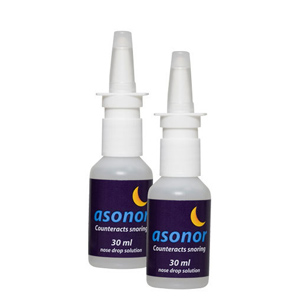Snoring has been defined simply as “noisy breathing that occurs when a person is sleeping.” However, it can be very disruptive, not only for the snorer, but their bed partner or spouse as well. The constant noises all through the night not only lead to disrupted sleep but the bed partner suffers the side effects of snoring as well. If you snore heavily then you are at a risk of developing sleep apnea, which leaves you gasping for breath at intervals all through the night. That is a harbinger of diseases and can lead to cardiac issues among other fatal diseases.
Understanding the basics about snoring, such as how to cope with it, how to treat it, what causes it, and when it’s dangerous are essential to eliminating a common cause of complaints and improving one’s overall health.
What Causes a Person to Snore?
When the tissues situated near the airway towards the back of your throat start to rattle and vibrate, it causes you to snore. As you sleep, your throat muscles loosen, thereby narrowing your airway. The moving air that results from inhaling and exhaling causes those tissues to flutter and make a noise referred to as snoring. Some individuals tend to be more prone to snoring issues because of the shape and size of their neck muscles and tissues. The more girth in the neck, the higher the chances of snoring as fatty lawyers tend to pressurize the throat tissues and airways when the individual lays down.
In other cases, excessive narrowing of the airway or tissue relaxation can cause you to snore. The throat tissues tend to vibrate when you respirate and that is why the whistling and weird snoring noises that you hear is due to the exhaling and inhaling through the narrow airways. Some of the risk factors that contribute to an elevated risk of snoring include:
- alcohol consumption
- chronic nasal congestion
- deviated septum
- jaw that is set back more or smaller than normal
- large tongue or tonsils
- nasal polyps
- obesity
- pregnancy
- prescribed sedatives
- soft palate
While individuals in any age group (young children included) can snore, we commonly see snoring issues occurring among older men and women with men snoring more often than women. That is because as we age, we lose muscle tone, and as the muscles loosen up, the vibrations are higher. This leads to heavier snoring every night. Trying out OTC anti-snoring remedies, such as Asonor anti-snoring nasal spray can help.
10 Risk Factors Attributed to Snoring
For many individuals, snoring can be a chronic problem that prevents them from getting the type of restful sleep they need and often leads to more serious health issues in the future. The following 8 factors put you at an elevated risk of snoring:
- anatomical issues of the nose and throat (e.g. enlarged tonsils, a narrow airway, or nasal polyps)
- being male
- being obese or overweight
- conditions resulting in an inflammation of one’s airway (e.g. respiratory infections, seasonal allergies, etc.)
- consuming alcohol
- genetics (family history of sleep disorders and/or snoring)
- looser throat muscles attributed to normal aging processes
- nasal congestion
- smoking cigarettes or cigars
- sore throats
If you’ve recently experienced any of these conditions or a combination thereof, you should probably visit your doctor for an evaluation and determine what’s causing you to snore. These risk factors could be associated with a more serious problem as well.
Is Snoring Dangerous?
Whether snoring is dangerous and poses additional health risks largely depends on how often you snore, the severity of your snoring, and the type of snoring. There are 3 basic categories of snoring that include:
- Infrequent or light snoring – This type of snoring is normal and usually doesn’t require any type of medical testing or treatment. The primary impact of infrequent or light snoring is that it bothers the person’s partner or spouse.
- Primary snoring – Snoring that occurs more than 3 nights per week on a regular basis is regarded as primary snoring because of its frequency. It is more disruptive to bed partners and other individuals in the home. However, it isn’t seen as a health concern or problem unless there are symptoms of sleep apnea associated with it.
- Obstructive sleep apnea or OSA-associated snoring – From a health perspective, this is a more worrisome form of snoring. If it continues to be neglected or goes without treatment, it can have an adverse impact on an individual’s health. If left untreated, OSA can lead to more dangerous health issues such as:
- anxiety
- cardiovascular issues
- daytime drowsiness or fatigue
- depression.
- diabetes
- hypertension (high blood pressure)
- stroke
When Should You Seek Medical Attention?
Snoring is not always a cause for concern or attributed to a more serious health issue. However, chronic snoring and snoring associated with OSA is. If you or your partner is overly concerned about your snoring, it’s probably time to seek medical attention. If you’re unsure about the issue, ask yourself the following questions:
- Are you carrying excess weight?
- Are you excessively drowsy in the daytime?
- Do you still feel tired regardless of the amount of sleep you’re getting?
- Do you wake up with morning headaches?
- Have you noticed changes in your ability to concentrate, your attention span, or your memory retention?
- Have you or your partner/spouse noticed interruptions in your breathing while you’re sleeping?
If the answer to any of these questions or a combination of them, it’s probably a good idea to schedule an appointment with your family physician.
Don’t let chronic snoring ruin your marriage or relationship. For almost immediate snoring relief, try Asonor Anti-snoring Solution, an anti-snoring product that has been clinically tested and proven to be effective in 3 out of every 4 cases studied. For additional information, visit our website or if you prefer, you can send us a message by clicking here.







